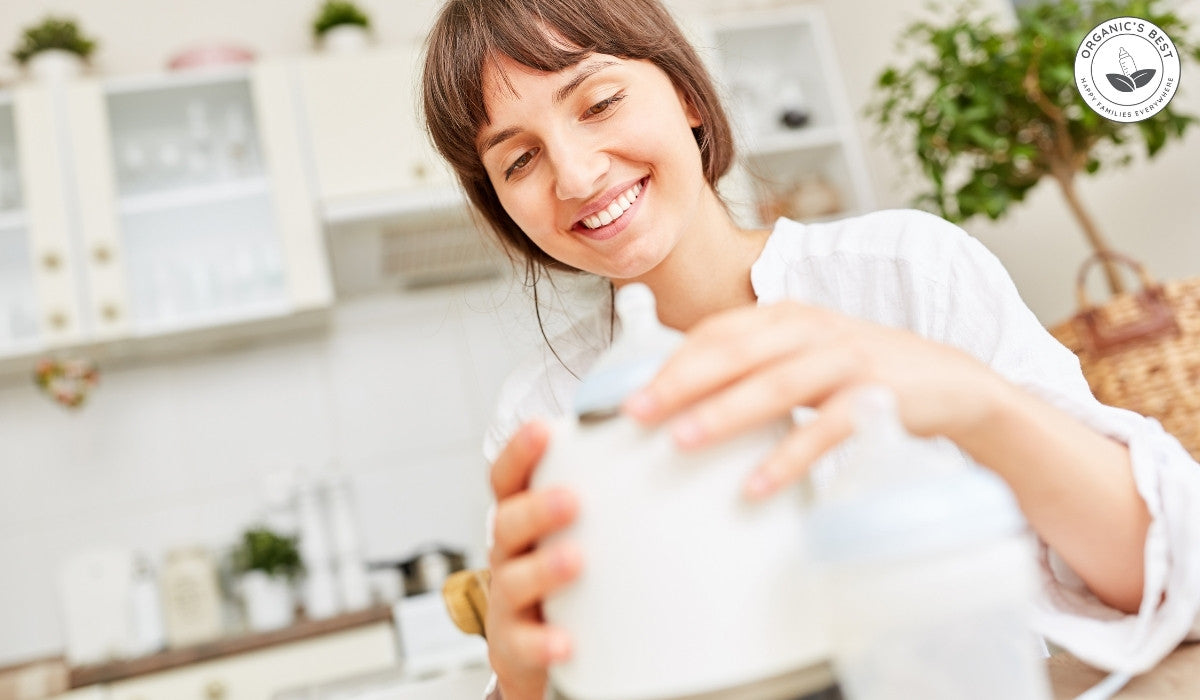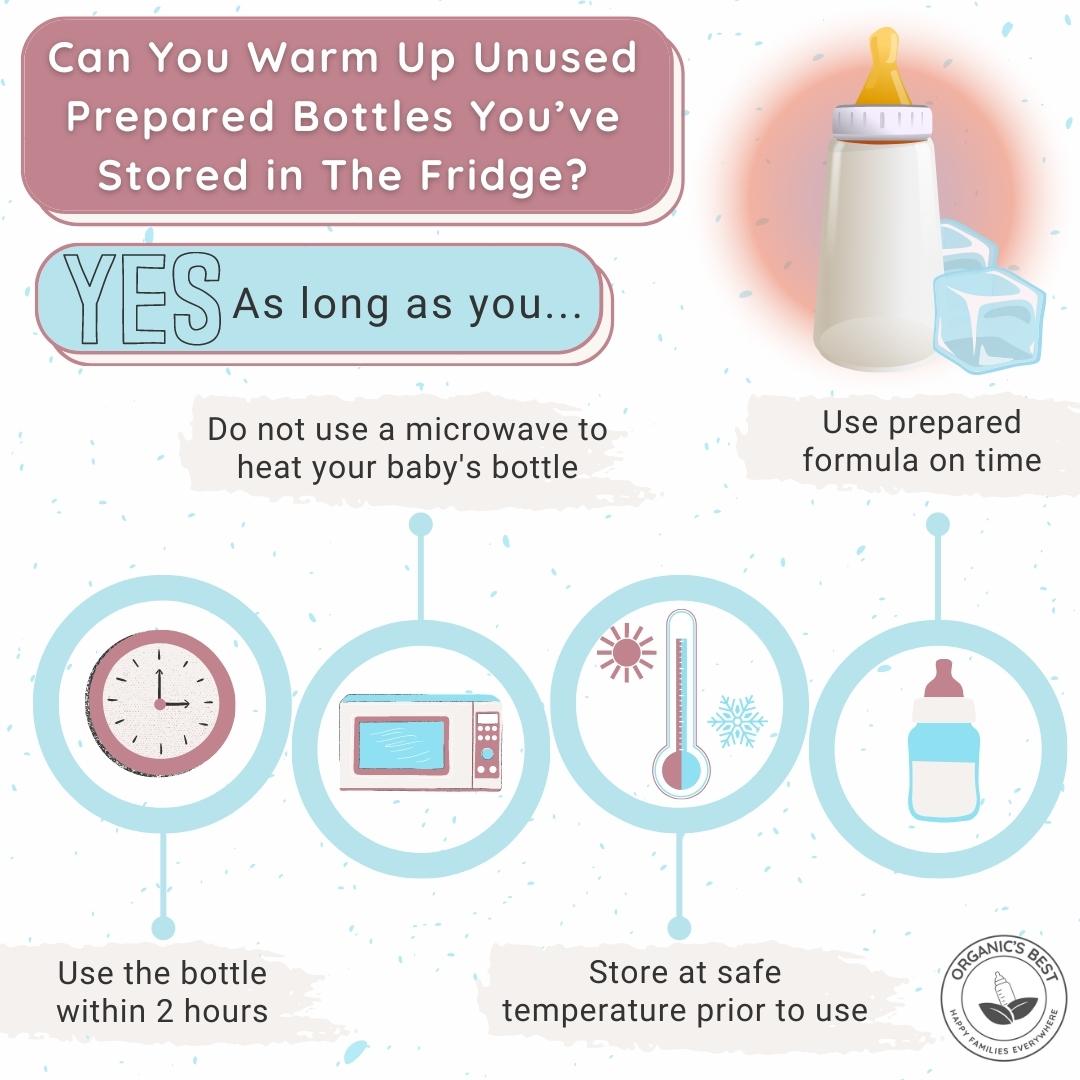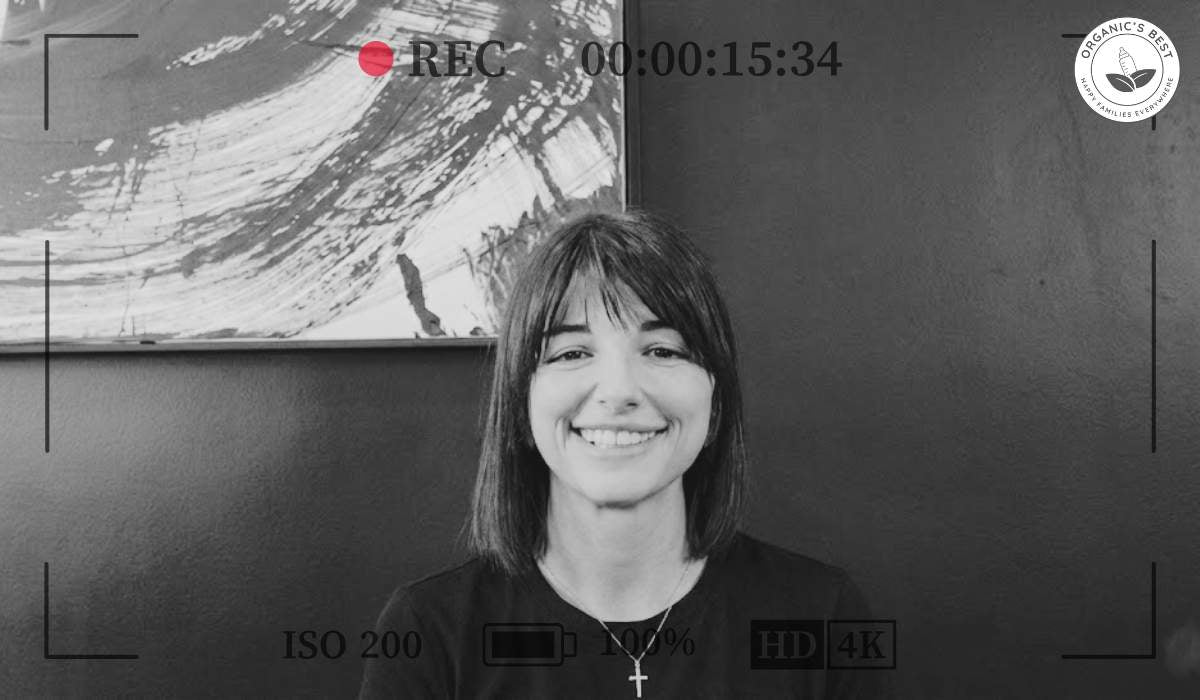Click to Get 2 FREE Boxes/Cans
Click to Get 2 FREE Boxes/Cans
Only New Customers! Click HERE to Get 2 Extra Boxes/Cans for Free With Your First Order.
Only New Customers! Click HERE to Get 2 Extra Boxes/Cans for Free With Your First Order.
BABY FORMULA
Offering new parents top-quality European infant formula from renowned brands like HiPP, Holle, Kendamil, and more. If you’re uncertain about which product to choose, our Formula Finder can help you make the best decision for your baby.
Baby Food
Offering new parents a premium selection of European baby foods, including jars, pouches, cereals, and snacks from esteemed brands like HiPP and Holle.
Can Formula be Reheated? What You Must Know...
by Agustina Fernandez March 07, 2023 9 min read

After a while of happily sucking away on their bottle, you may notice that your baby is beginning to get full through signs like coy head turns and pursed lips. This may happen before they've completely finished a feeding, leaving you with a few ounces left in hand. If this is a common occurrence for you, you can waste quite a lot of formula over time.
Now you're faced with a predicament... do you save the remaining drops and reheat the formula later? Can formula be reheated or is it best to discard the remaining baby formula? We’ve got the answer to these important questions and some essential tips on how to avoid this situation altogether.
In this article, we will cover topics such as, what happens if you reheat infant formula, tips on how to avoid wasting baby formula, how to safely store prepared formula, and more!
Table of contents
What Happens if You Reheat Formula?
A lot of us are guilty of warming up our own leftovers, perhaps one too many times. Although, when it comes to baby formula, it is not worth taking that risk. When you reheat formula after a feeding, it can negatively impact your baby's health. There are a few reasons why, let's take a look at them below 👇.

1. Bacteria Breed From Your Baby's Mouth 🦠
If your baby doesn't finish their bottle, don't try to save formula, instead, discard the leftovers because harmful bacteria from your baby's mouth can enter the bottle during feedings. Unfortunately, even if you put the bottle directly in the refrigerator after a feeding, the lower temperature cannot keep certain pesky bacteria from growing and multiplying.
2. Nutrients Degrade 💔
You may be wondering if perhaps reheating the formula has the power to kill any bacteria that would grow at a cooler temperature. While we understand where your head is at, the answer is no, as the extremely high temperature needed to kill off harmful bacteria is not suitable for consumption by a baby and repeatedly reheating formula can degrade the essential nutrients.
3. It Increases The Risk of Foodborne Illness 🤒
The more risks you take when preparing your baby's formula, the more likely they are the develop a foodborne illness; only a small number of harmful bacteria are needed to make a baby sick.
This is in part because babies have weaker immune systems than adults making them more susceptible to foodborne illness. Foodborne illnesses can cause gastrointestinal symptoms like vomiting and diarrhea which can lead to serious health complications in infants.
Can You Warm Up Unused Prepared Bottles You’ve Stored in The Fridge?
Contrary to popular belief, it is not necessary to give your baby breast milk or formula that has been warmed. Both cold formula, room temperature, and warm formula are perfectly safe to consume, it just comes down to your little one's preference.
Learn More: Can Babies Drink Cold Formula?
If your baby likes a warmed bottle, it is super simple to heat up their formula or breast milk. Just place a filled bottle under running warm water, in a bowl of warm water, or you can use an electric bottle warmer.
Always make sure to test the temperature of your baby's bottle before serving it by putting a few drops on your own hand or wrist. Make sure that the formula or breast milk is lukewarm, if it feels too hot, don't serve it right away.
All of this to say, yes you can warm up unused prepared bottles, but there are a few guidelines to follow to ensure that the bottles are safe for your baby to consume which we'll walk you through in the next section.
Safe Formula Feeding 101

Do not use a microwave to heat your baby's bottle ⚠️: A microwave may seem like a simple solution when you're in a pinch to warm the bottle but microwaving formula is dangerous as it can create hot spots in your baby's milk which could burn their mouth, so make sure to steer clear of this method.
Store at a safe temperature prior to use ❄️: If you like to prep in advance, your baby's bottle should be kept refrigerated at a temperature of 4°C or below until you're ready to feed. At temperatures above 4°C, harmful bacteria can grow (Keep reading to learn more about how to safely prep bottles in advance)
Use prepared formula on time⌚: As a general rule, prepared formula that has been refrigerated should be used within 24 hours. Although, this can differ slightly depending on the product so it is best to consult the manufacturer's instructions.
Use the bottle within 2 hours 🍼: It is best to serve a fresh formula bottle to your baby immediately, but technically it can be used within a 2-hour time frame. However, after the 2-hour mark, the remaining formula must be discarded.
How Long is Infant Formula Good For Once it’s Been Warmed?
We're no strangers to the fact that life can get a little hectic, but once formula has been prepared and warmed it's best to serve it to your little one immediately. Luckily, because serving it right away is not always possible, you do have that two-hour wonder window where the bottle can safely be consumed.
Even though wasting formula isn't ideal, if your baby has not finished their bottle within this time frame, leftovers should be discarded. You may be tempted to reheat baby formula for a later time, but refrigerating formula that has already been warmed and partially consumed by your baby is dangerous.
Depending on the type of formula that you are using, the guidelines for safe consumption and storage may differ, so always follow the specific recommendations given by each manufacturer.
Read more on this topic: How Long is Formula Good For?
How to Prepare and Store Formula
Here are some general guidelines to help clarify the best practices for storing and prepping different types of formula.

Ready-to-use Formula
Any unused ready-made formula from a freshly opened container can be covered and refrigerated for up to 48 hours (certain products recommend discarding after 24 hours, so make sure to follow the guidelines for your specific product).
Liquid-concentrate or Powdered Formula
To save time, you can prepare several bottles in advance and refrigerate them. However, there are some important precautions to keep in mind when opting for this method...
Here are some guidelines for safely preparing bottles in advance:
🍼 Label each bottle to keep track of the time and date they were prepared
🍼 Place bottles in the refrigerator immediately after preparing them
🍼 Discard any unused baby formula after 24 hours
🍼 If you're wondering whether or not a bottle of formula is safe for your baby to drink stick to the mantra of when in doubt throw it out!
Read: Formula Measuring and Mixing Made Simple
Tips on How to Avoid Wasting Baby Formula
As mentioned before, it's better to waste a bottle of formula instead of reheating formula and risking health complications for your sweet babe. That being said, no one wants to waste baby formula, so here are some practical tips on how to prepare it in a way that limits the chances of having to discard it (yay for saving time and money!).

Keep a supply of ready-to-feed formula: Keeping a supply of ready-to-feed bottles can be great for topping up feedings that end up being too small. This way you don't have to go through the hassle of preparing new bottles of baby formula from scratch.
Get in the habit of preparing only what you need for a feeding: This can include preparing multiple bottles in advance, but in this case, try not to overestimate what you need. Additionally, try not to put more than what your baby needs into their bottle because whatever they don't consume you're going to have to dump.
How to Safely Store Prepared Powdered Formula
Storing and making up formula safely is an integral part of caring for your little one. Following these simple steps at home can protect your baby's health by reducing the risk of foodborne illness!
How to Prepare Your Space
Any items used to feed your baby must be washed and sterilized before each use. Keeping things squeaking clean protects your little one as improperly washing feeding equipment can lead to a higher chance of your baby getting an infection.

To properly prepare your feeding equipment you should follow these steps:
-
Clean countertops and hands with soap and warm water 🧼
-
Clean and disinfect utensils and thermometers 🍴
-
Sterilize feeding equipment by submerging it in boiling water for 2 minutes and letting air dry. If you are not using them right away, cover them with a clean towel 💦
You might also like: How to Tell if Powdered Formula is Bad
How to Prepare the Formula
When preparing formula, there are numerous factors to keep in mind that can influence which steps must be taken to ensure that it's safe to feed to your baby. This includes; whether your child was a preemie or born at a low birth weight, your baby's age, and whether you intend to use the formula immediately or save it for later.
We will cover each of those circumstances below, but let's begin with general guidelines that should always be considered when preparing formula for an infant:
-
Not all infant formula is sterile, even when it comes in sealed cans or boxes, powdered formula can still contain bacteria.
-
It is best to prepare one bottle at a time, right before your baby is ready to be fed. This is not always the most convenient or even possible at times, so knowing how to refrigerate formula safely is also a necessity.
-
Use freshly boiled tap water when preparing a bottle as opposed to softened water or previously boiled water.
-
Check the temperature of baby formula before serving to ensure it isn't too hot.
How to Prepare Formula For...
1. A baby that is premature, has a low birth weight under two months, or has a weakened immune system
A baby's immune system is already weaker than ours, so if they are premature, underweight, or have immunity issues, this must be taken into consideration when it comes to formula preparation.
Sometimes extra steps or care must be taken to keep them healthy and reduce their risk of infection, but overall you should follow these general feeding guidelines which include:
-
Boil any water that will be used for feedings for 2 minutes (FYI, even bottled water is not sterile).
-
Let the water cool for 30 minutes (or until it reaches 70°C) then prepare the bottle according to the manufacturer’s instructions using sterilized feeding equipment. Certain formulas cannot be prepared using boiled water cooled to 70°C, due to heat-sensitive ingredients, such as probiotics. Many European formula manufacturers recommend cooling to 40-50°C. In this case, it is best to consult your pediatrician for advice on using these formulas.
-
Serve formula as soon as possible once prepared and cooled and discard any formula that hasn't been consumed after 2 hours.
2. A baby that is a healthy, full‑term infant
When it comes to a healthy, full-term infant, the same rules apply as above, such as serving the formula as soon as possible and using it within 2 hours, although you can use boiled water that has been cooled to room temperature as opposed to 70°C to prepare formula.
3. Later use
If you are not going to use the formula right away, follow these steps:
-
Place any formula that you won't be using into individual sterilized bottles and immediately cool under cold running water.
-
Keep refrigerated at a temperature of 4°C (do not put in the freezer)
-
Use any prepared, refrigerated formula in the timeframe specified by the manufacturer (in most cases this is within 24 hours)
-
Warm the prepared formula until it reaches between room temperature and body temperature for no more than 15 minutes as warming it up for longer increases the likelihood of bacteria growth. And of course, don't use a microwave to warm bottles.
-
Use the bottle immediately or as soon as possible within 2 hours. Do not place it back in the refrigerator, as warmed, prepared formula cannot be reused.
Conclusion
We know that was a lot of information to cover, and it may seem overwhelming, but you will get into the routine of preparing and serving bottles soon enough. As you get to know your baby's routine and watch them grow, it will likely get easier to anticipate the amount and frequency of their feedings, making bottle preparation simpler and more predictable. In the meantime, follow the above guidelines, enjoy all the special moments with your little one, and remember, you got this!
|
Disclaimer: Please be aware that this information is based on general trends in babies, and it is not medical advice. Your doctor should be your first source of information and advice when considering any changes to your child’s formula and when choosing your child’s formula. Always consult your pediatrician before making any decisions about your child’s diet or if you notice any changes in your child. Breastfeeding is the best nutrition for your baby because breast milk provides your child with all the essential nutrients they need for growth and development. Please consult your pediatrician if your child requires supplemental feeding. |
Agustina Fernandez
Dr. Agustina Fernandez earned her medical degree from the prestigious Universidad Nacional de Córdoba, Argentina. With a deep-rooted passion for pediatrics, Dr. Fernandez is currently on the path to specializing in children's healthcare. Recently, she has delved into the vital field of infant nutrition. Her research interests include breastfeeding, infant formula, and baby food in little ones’ formative years. Dr. Fernandez's commitment to this area of study underscores her dedication to ensuring the health and well-being of children from their earliest days.
Leave a comment
Comments will be approved before showing up.
Also in Organic Infant Nutrition and Health Blog

European Baby Formula Stages: What New Parents Need to Know
by Agustina Fernandez February 18, 2026 12 min read
Read More
Infant Feeding Guide for New Dads: Bottle Feeding Tips
by Agustina Fernandez February 10, 2026 10 min read
Read More
Spilled Milk: Feeding Unfiltered with Hayley
by Agustina Fernandez February 04, 2026 4 min read
Read More
Reviewed by Dr. Po-Chang Hsu, MD, MS
-

Dr. Po-Chang Hsu: Medical Reviewer of Organic's Best Blog
Dr. Hsu received his medical degree from Tufts University in Boston, Massachusetts, and holds a Master’s of Science degree from both Harvard University and Tufts University.
